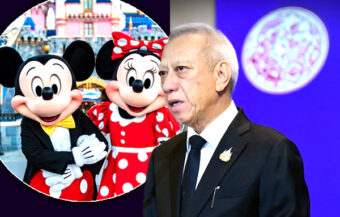The White Lotus gave Thailand a luxury glow-up but failed to lift overall tourist numbers—raising fears it may alienate mass market punters and turn the kingdom into an elitist retreat. Bookings surged on Samui, but backpackers aren’t biting.
The premiere of The White Lotus Series Three in February didn’t give Thailand a major boost in foreign tourism numbers. However, booking and room rates on Ko Samui, where it was filmed, are significantly up. This particular series was all about spiritualism, meaning, and wellness. Thai spirituality remains vague and hard to define, making it tricky to market to the mass market. This is exactly what Thailand’s tourism industry needs if it’s to hit 40 million foreign visitors a year, as it did in 2019. In the meantime, the show, which tried to bridge the gap between Western sensibilities and Thai spiritualism, may have ended up confusing at least some potential tourists. Indeed, the kingdom may appear as an elitist destination to mass-market punters who are still its mainstay.

In February 2025 the HBO series White Lotus, featuring Thailand in its third edition, premiered on its broadcast platforms. The hot show had previously been set in Hawaii and Sicily.
The White Lotus has become a global phenomenon—and its third season, set in Thailand, was no exception. Known for its mix of satire, scandal, and spectacular settings, the HBO hit continues to drive luxury travel demand wherever it goes.
Following seasons in Hawaii and Sicily, creator Mike White took the Emmy-winning show to Southeast Asia. Season three unfolded across Thailand’s most picturesque destinations—Koh Samui, Phuket, and Bangkok.
Thailand set the stage for a spiritual White Lotus season with satire and stunning high-end backdrops
The creator of the show previously summed up the third offering. “The first season was about money, and the next season was about sex. I think season 3 will be a satire and a funny angle on death, Eastern religious beliefs, and spirituality,” he explained before the premiere.
Season three was filmed primarily at the Four Seasons Koh Samui, but scenes were also shot at nearby resorts like Anantara Bophut. Other key locations subsequently included the Four Seasons in Bangkok and Anantara Mai Khao in Phuket.
The show is said to be a dark comedy with emotional undertones and somewhat chaotic movements. One of the characters, Rick, visits Bangkok and meets a friend at the city’s timeless Mandarin Oriental Hotel. The long-term expat character he meets is Frank, played by Sam Rockwell. He has some hair-raising stories about his life in the Thai capital.
Rick’s arc has been praised as one of the most meaningful in the season. His confrontations with his past mirror Buddhist themes of detachment and transformation.
Just two months after the show aired it has coincided with a downturn in Thailand’s tourism numbers. However, the number of long-stay high-end European and Western visitors is up. Certainly, so too are bookings on Koh Samui.
Samui bookings boom post-White Lotus but overall tourist numbers dip despite upmarket interest
According to data from Trip.com, bookings in Koh Samui rose nearly 30% year-on-year. Meanwhile, Expedia reported a 370% spike in interest from Hong Kong travellers.
This is a TV show that appeals to a more middle-class and refined group of people. Therefore it is too much to expect a mass market effect. This is indeed what happened with the huge success of Danny Boyle’s The Beach in 2000. In short, it spawned a huge backpacker influx of young students or Thai-wanderlust twenty-somethings to explore Thailand.
By contrast, The White Lotus fuels interest in exclusive resorts, not backpacker trails. Most bookings have been from mature travellers in the UK, France, Germany, and the US.
Significantly, the theme of the third White Lotus is spirituality. Of course, this is a more difficult sell than money or sex. Contrast that with Thailand’s sex tourism boom which started in the 60s and 70s and was a huge success. Indeed, it extends to this day.
Though Buddhism is a central theme, the show was still seen through Western eyes. Thai spirituality was admired, yet often misunderstood or overshadowed by Christian symbolism in the finale.
Western perspectives still dominate despite efforts to centre Thai culture and spiritual themes
The problem for Thai tourism managers in 2025 is that the Western markets where the money is have become more sophisticated. In brief, they are more difficult to sell to. Today’s affluent travellers want depth. The show’s attempt to depict Thailand as more than a paradise getaway has resonated, though some critics noted its limitations.
The inclusion of Lalisa “Lisa” Manobal, in her acting debut as a wellness instructor named Mook, was widely praised. Her performance gave emotional weight to Thai representation in the series.
Other Thai actors and creatives also shaped the production, supported by advisers and the Tourism Authority of Thailand. The effort aimed to avoid old clichés.
In the opening credits, characters were rendered in temple-style mural art, blending East and West. Even bird calls used in the soundscape—like the Asian koel—anchored scenes in real Thai environments.
However, local characters mostly remained in service roles. Their lives were rarely the focus. The series, for all its beauty, still prioritised foreign narratives.
Thai creators added texture and detail but local lives remained sidelined by foreign-driven story arcs
One striking moment featured Carabao’s nationalist anthem “Made in Thailand”, rich in cultural pride. Yet its message was missed by most viewers unfamiliar with its deeper meaning.
As interest in the show’s locations surged, average room rates in Koh Samui reportedly jumped 28%. Hotels braced for the ‘White Lotus bump’, much like Hawaii and Sicily did in earlier seasons.
Certainly, the online feedback was 85% positive. Indeed, the mentions of Thailand were 95% positive. Yet this was no juggernaut for the tourism industry.
Even so, some even voiced concern at this. This is the new reality of a new, more middle-class sensibility. Could this boom lead to over-tourism? Would Thailand follow the path of Venice or Bali, where mass tourism has strained local communities? Experts have called for sustainable strategies—spreading visitors beyond hotspots, limiting numbers in fragile areas, and preserving cultural integrity.
Positive buzz brings awareness but not a boom and raises fear of turning off simple mass tourism audiences
The show’s cast included both established and fresh faces. Alongside Sam Rockwell were Carrie Coon, Jason Isaacs, Walton Goggins, Leslie Bibb, Michelle Monaghan, and Thai actor Dom Hetrakul.
Fan-favourite Natasha Rothwell returned from season one as spa worker Belinda, adding a layer of continuity across the series.
Production spanned six months. Cast and crew lived nomadically across resorts. Michelle Monaghan described the experience as both intense and unforgettable. Though the resort in the show is fictional, it draws from real luxury properties. Villas featured private chefs, infinity pools, and sweeping ocean views.
Critics applauded the show’s ambition. Early reviews praised its storytelling, its blend of humour and tension, and its attempt to treat Thailand’s spiritual identity with care. Still, the final scenes betrayed that promise. Thai Buddhism faded into the background. Closure came with a Christian hymn, not a Buddhist chant.
High-profile cast and lavish shoot wowed critics but final scenes still leaned into Western symbolism
The result? A show that got closer to authenticity than many before it—but still stopped short of fully letting go of the Western gaze.
If Thai tourism planners want a bump in numbers, certainly they will have to stick to the mass tourism model. That means keeping it simple with films that explore sun, sea, and sex.
Undoubtedly, Thailand will not reach the 40 million visitors it saw in 2019 this year. However, it may be facing a higher spend per tourist, as this year there are significantly more long-haul tourists.
Hollywood blockbuster Jurassic World 4 with $265 million budget begins filming in Thailand next week
Film and creative revolution being brewed by ‘Ung Ing’ to transform Thailand’s global soft power
Night owl Bernard Trink, a legend who helped spawn Bangkok’s infamous nightlife of the 1960s into a World hit
In the meantime, the kingdom already has a hard-to-lose image which harks back to the days of sex tourism in the 70s. That saw the filming of the James Bond classic The Man with the Golden Gun, starring Roger Moore. Trying to market wellness and spiritualism is a bit more tricky if not a self-defeating proposition.
Join the Thai News forum, follow Thai Examiner on Facebook here
Receive all our stories as they come out on Telegram here
Follow Thai Examiner here
Further reading:
Jim Thompson the original ‘farang’ who ushered in the heyday of the expat in 20th century Thailand
‘The Serpent’ serial killer who terrorised Bangkok released by Nepal on human rights grounds
Iconic 70s Bangkok comes to life again as the dark story of The Serpent wows world Netflix audiences
Filming of Fast and Furious movie begins in Krabi in what will be a big boost to the local economy


















